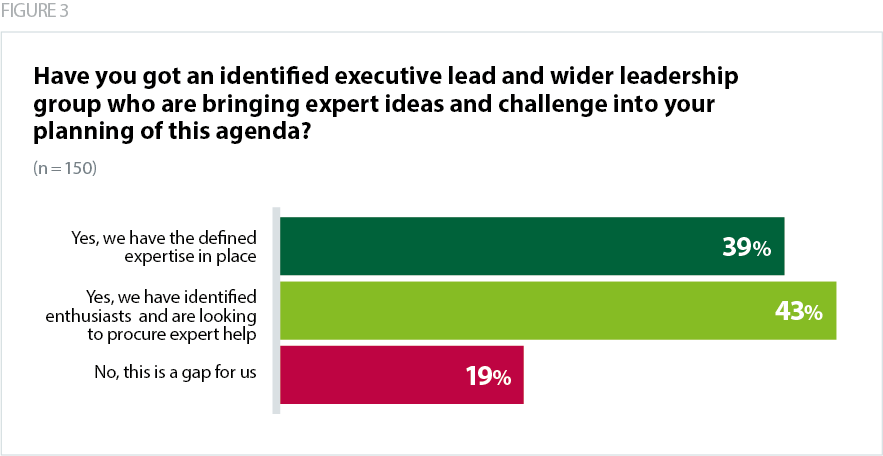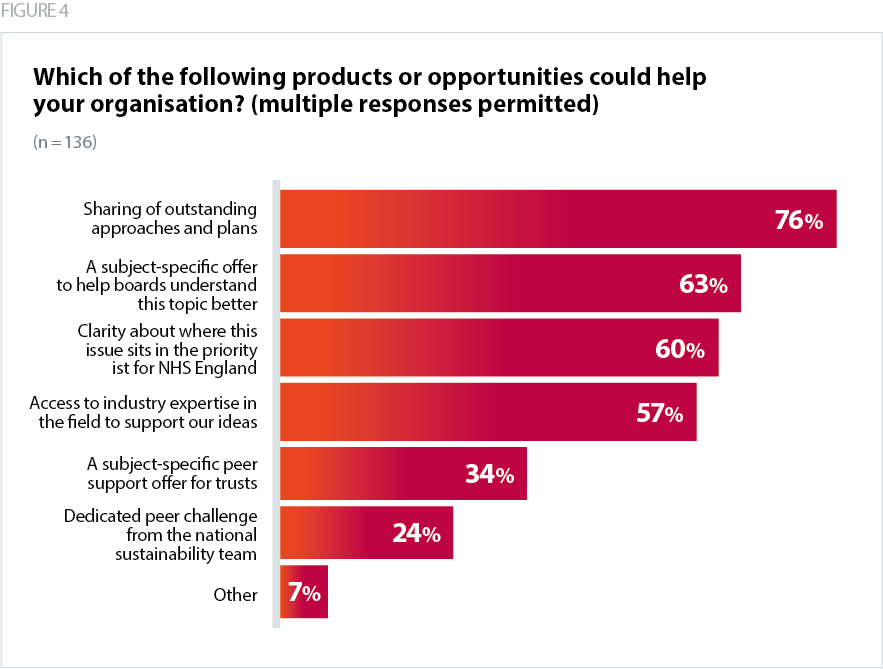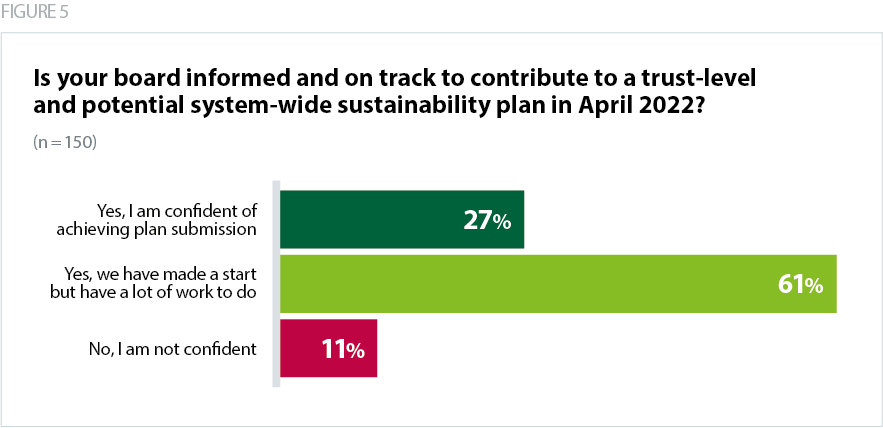Enablers
Executive leads bringing expert ideas and challenge
In order to achieve significant change, environmental sustainability needs to be woven into the NHS' day to day business and aligned with broader strategies and operational priorities. However, trust leaders recognise that they are not experts on this topic, and most would welcome support from peers and industry expertise to supplement their internal knowledge.
Trusts highlight the importance of championing the sustainability agenda from the top of their organisations. The Greener NHS team has highlighted that the development of green plans should be led by a designated board-level net zero lead. A number of trusts are appointing executive leads within their organisation and have set up wider leadership groups to bring expert ideas and challenge into their planning of this agenda. However, trusts are at different stages, with around one fifth of respondents (19%) telling us that this was a gap for them (Figure 3). Trusts describe the benefit of bringing expertise in-house to support strategic focus and robust planning.

"We have had a long-standing sustainability team and strategy - a new version of which has just been approved. We are ensuring sustainable decision-making across the organisation, and have been on a journey to do so over the last 10 years."
"We have a paid role for an extremely keen consultant who is an expert in this field".
"...We have aspirations to deliver on this agenda and are doing positive things. However, the current pressure doesn’t leave much time for sustained thinking on these issues."
“We are in the process of developing our plans under the Executive Lead for Sustainability. That is not to say that we will not seek external expertise in some areas, but I am confident that we are going to make progress on this front."
Focusing on areas which offer clinical and financial benefit
Identifying quick and simple changes, particularly ones which offer clinical and financial benefit can be a valuable starting point for trusts to make tangible progress. For example, the 2021/22 NHS standard contract identified anaesthetic gases, which account for over 2% of all NHS emissions, as a key area for early action. The existence of low carbon alternatives that are clinically appropriate and financially viable mean it is easier to mainstream innovations like this at pace, particularly where there is national support and guidance. Switching to low-energy LED lights can be achieved relatively quickly and provide longer-term efficiency savings.
Aligning environmental sustainability with new ways of working
Connecting environmental sustainability ambitions to new ways of working is also a key driver of change. For example, the use of digital services, which was accelerated during the COVID-19 pandemic, significantly reduces the need to travel to and from physical healthcare sites. The 2021/22 NHS planning guidance set out an expectation for trusts to deliver at least 25% of outpatient activity remotely, where clinically necessary. This enables trusts to reconsider new care models where it is appropriate and does not compromise patient safety and with a focus on care being provided closer to people's homes. It will be important for trusts to ensure the changes to services as a result of aligning objectives on both operational performance and environmental sustainability are made in a way which does not exacerbate inequalities for those without digital literacy.
Drawing on the enthusiasm of the workforce
Trust leaders and sustainability teams say that listening to their staff helps shape and embed large scale change across their organisations. A number of trust leaders we spoke to said that they are drawing on the enthusiasm and passion that exists within their organisation. NHS staff play a key role, whether it be contributing to changes being made in their workplace, or as part of their personal lives, such as switching to using an electric vehicle. Equally, employers can enable these changes through employment contracts, discounts and subsidies to incentivise green alternatives, such as cycle to work schemes. Galvanising their support can make a difference.
Support from the national bodies
NHS England and NHS Improvement's emphasis on sustainability is welcome. The national regulators, such as Care Quality Commission and NHS England and NHS Improvement, have a role to play in supporting behavioural change. An emphasis on sustainability from them may enable trusts to prioritise this issue and connect it to improving the quality and safety of their services. It will be important that the work of its regional teams and that of ICSs reflects this national commitment including in how trusts are assessed, monitored and supported.
Changing procurement practices and driving behavioural change among suppliers will likely be more effective at scale. NHS England and NHS Improvement also has an important role in setting the standard nationally for what it expects from trusts and suppliers, creating an incentive at this level to reduce carbon emissions. ICSs will also have a role in setting local standards and encouraging the shift of local economies towards more sustainable models.
A standardised approach to accounting for carbon impact (i.e. labelling the carbon footprint of products, supply chains and processes) will need to be reported routinely at local, regional and national level to improve transparency and aid understanding.
Finally, sufficient investment in new ways of working, including via national funds, will be critically important. Some interventions to reduce emissions are cost effective and can offer a financial benefit. Some additional funding has been made available to trusts to support large scale interventions. This includes the £50m NHS Energy Efficiency Fund for LED lighting, and £260m awarded to the NHS from the government's public sector decarbonisation scheme. This support has made it possible for some trusts to progress their plans, and it is crucial that sufficient capital investment is made available to support large-scale change appropriately.
Barriers
The knowledge gap
It is clear that while trusts are keen to prioritise the sustainability agenda, there are barriers to translating ambition into action. The majority (76%) of trust leaders who responded to our survey wanted to know more about outstanding approaches to sustainability as they face up to this significant challenge (Figure 4). Furthermore, over half told us they would like to see a subject-specific offer to help boards understand this topic better (63%), more clarity about where this issue sits in the priority list for NHS England and NHS Improvement (60%) and have access to industry expertise in the field to support their ideas (57%).

Competing short-term priorities
Trusts continue to face significant operational pressures as a result of the COVID-19 pandemic and broader demand pressures. While access to commercial expertise and board-level championship of the issue is important in driving forward this work, short-term, competing priorities, remain.
Just over a quarter (27%) of respondents to our survey said their board is informed and on track to submit their plan and contribute to a system-wide plan in time for April 2022; and over half (61%) said they are on track but feel they still have a lot of work to do. Around one in ten (11%) trust leaders do not feel confident about submitting a plan within the timeframe (Figure 5). A number of trusts highlight the challenges of prioritising the agenda when operational pressures are high. Others have expressed concern about their bandwidth and ability to deliver their green plans and prioritise this issue in the way they would like.

"...Competing short-term priorities and capacity [challenges] are the reasons why."
"We get the message and have started on our mission, but, my goodness we are being blown off course by (hopefully) short-term turbulence."
"We're in the early days and the agenda is full. But we recognise this issue needs to be addressed."
"Headspace is lacking and there isn't sufficient capital available for necessary investments."
System-wide effort needs development
A joined-up approach is essential to gaining traction at the pace and scale required. For example, while decarbonising heat is a key challenge for trusts, connecting with other sectors may offer opportunities to innovate. For example, a new energy centre was set up in the London Borough of Islington that is enabling the use of waste heat from the London Underground to provide heating and water to homes. However, this level of collaboration on environmental sustainability is scarce. A number of trusts have highlighted the need for changes to the wider infrastructure in their local areas, such as availability of charging points for electric vehicles, is needed to support them with their decarbonisation efforts. This highlights the importance a system-wide effort and is reliant on the success of ICSs' plans.
"We are clear as a trust on the immediate next steps. It remains to be seen how the system, as a whole, addresses this issue as we haven’t yet got an approved chair and chief executive in place."
Mutual interdependence is a clear enabler of sustained action. Whether that is through bilateral work or more formal partnerships, it will be important that systems work together to lift all local NHS organisations to make a difference.
Influencing partners where the NHS does not have direct control
National NHS policy has identified three key ways to reduce emissions from NHS supply chains including: more efficient use of supplies, low-carbon alternatives and product innovation, and through ensuring its suppliers are decarbonising their own processes. The NHS has made some progress in using resources more efficiently, such as reducing the reliance on disposable products and single-use plastics. However, decarbonising broader supply chains is a key challenge, as this is not an area health policy makers, or trusts, can control directly. As a purchaser of services, the NHS can, however, drive behavioural change in its suppliers. Trusts and ICBs procuring services from the commercial sector need to take a joined-up approach to drive change and send a cohesive message to suppliers.
Some land and NHS buildings are held by NHS Property Services and under private finance initiative (PFI) contracts rather than directly owned by trusts. NHS Properties owns 10% of NHS estate and recognises that it has a role to play in the journey to net zero. However, there is a risk of a two-pace change model emerging, as trusts have to gain permission to make changes to estate they do not own. Trusts should not be held back from work to change the energy efficiency of their buildings, and support at a national level may be required to ensure alignment on this objective.
In addition, trusts with ongoing challenges with their estates face an uphill battle to secure funding to improve them, but need access to capital so they can make progress on the energy efficiency of their buildings. It is important that the risk of PFI estate lagging behind the NHS in this regard, is avoided. Investors in large PFI estates should consider taking a lead in addressing any perceived conflict between commercial returns and environmental sustainability.